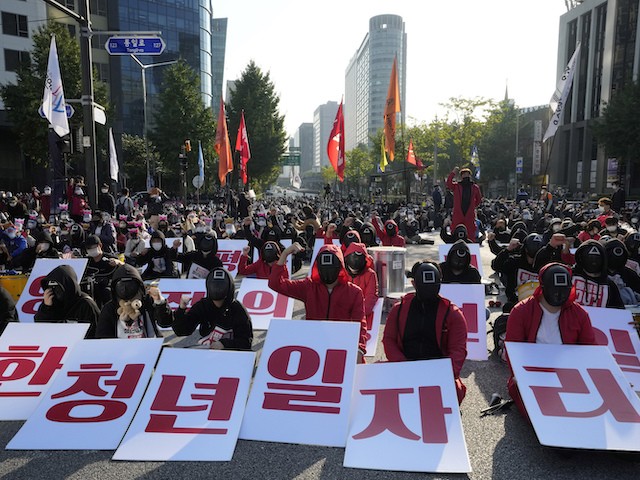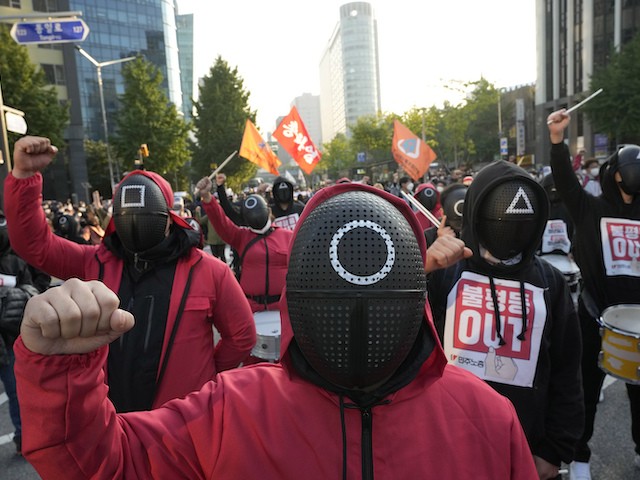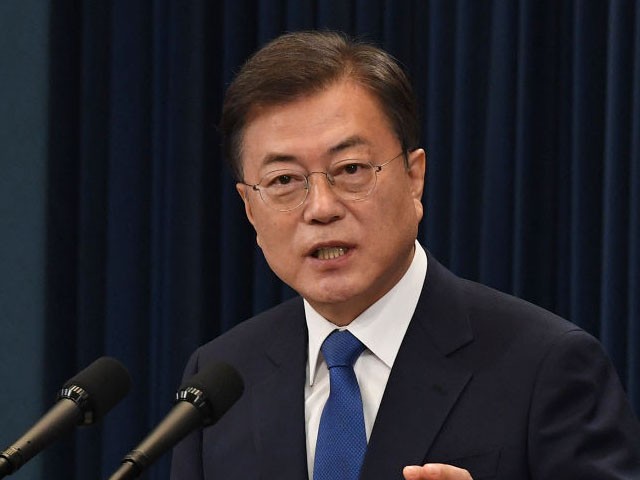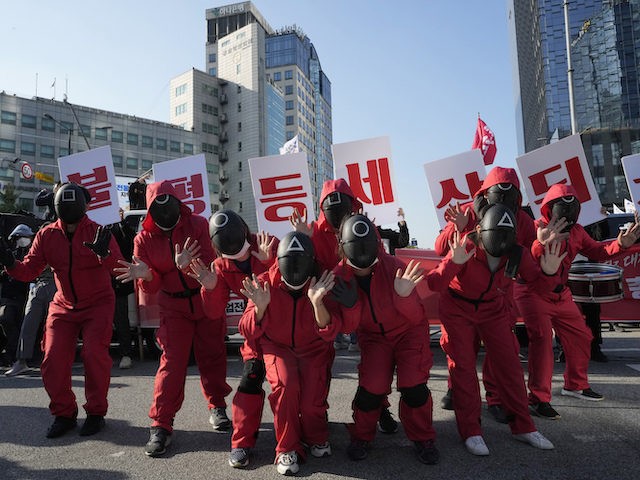The city of Seoul, South Korea, on Thursday filed a police complaint against members of the Korean Confederation of Trade Unions (KCTU) for holding an illegal demonstration that violated coronavirus social distancing policies.
The demonstrators were clad in costumes from the South Korean TV show Squid Game, which became a massive international hit for the Netflix streaming service.
More specifically, the demonstrators dressed as the villains from Squid Game – the grim masked “referees” who ruthlessly execute contestants who lose a series of children’s games, then efficiently dispose of the corpses and hose blood off the floor of the arena.
A "Squid Games" Workers' Protest In South Korea Demands Job Security https://t.co/zNXX2rrrby pic.twitter.com/yMqSlHw6UN
— NDTV News feed (@ndtvfeed) October 21, 2021
Squid Game masks are available for purchase from your favorite capitalist megastores, including Wal-Mart and Amazon, just in time for Halloween. Jumpsuits and murder weapons are sold separately.
After purchasing high-quality replica costumes from their favorite anti-capitalist fable, about 80 members of the KCTU’s youth wing set about banging drums, dancing in the street, and waving signs with slogans such as “Inequality Out” and “Safe Youth Employment, Quality Youth Unemployment.” Thousands of other union members reportedly joined the demonstration.
A KCTU statement said the Squid Game motif was chosen because the show “bitterly satirizes the bare face of our society.”
CBS News reported on Thursday that Squid Game is very popular with the union confederation’s members and imagery from the show has been prominently featured in recent KCTU promotional videos.
“The main character is [sic] the series, Seong Gi-Hun, is an autoworker who lost his job when the company he spent years working for went bust,” CBS observed. “His flashbacks draw stark parallels to the real-life 2009 bankruptcy of the Ssangyong automaker, and the subsequent violent crackdown on laid-off employees who occupied its factory, demanding their jobs back.”

Members of the South Korean Confederation of Trade Unions wearing masks and costumes inspired by the Netflix original Korean series “Squid Game” attend a rally demanding job security in Seoul, South Korea, October 20, 2021. (AP Photo/Ahn Young-joon)
“Some scenes were very hard to watch,” Ssangyong employee Lee Chang-keun told the Associated Press last week.
“In Squid Game, you see characters scrambling to survive after being laid off at work, struggling to operate fried chicken diners or working as ‘daeri’ drivers. That reminded me of my co-workers who died,” he said.
Lee was referring to suicides among the thousands of Ssangyong workers who were laid off when the company filed for bankruptcy in 2009. Some of them, including Lee, eventually got their jobs back, but only after years of legal battles and financial hardship. Daeri unjeon is a ride-hailing service that specializes in getting drunk people home after a night of carousing.
In addition to dealing with the aftermath of calamities like the Ssangyong bankruptcy, South Korean workers also complain about working very long hours with little job security, while seething with resentment at a privileged, insulated, politically connected, and corrupt elite known as the chaebol.
Broadly speaking, the chaebol comprises a few dozen family-owned corporations that became extremely wealthy, with considerable assistance from the government, during South Korea’s period of explosive economic growth. The villains in Squid Game are a particularly vicious satire of the chaebol attitude and lifestyle.

Members of the South Korean Confederation of Trade Unions wearing masks and costumes inspired by the Netflix original Korean series “Squid Game” shout slogans during a rally demanding job security in Seoul, South Korea, October 20, 2021. (AP Photo/Ahn Young-joon)
The city of Seoul filed a complaint with the police because the demonstration violated coronavirus safety rules. The KCTU responded that it believes the coronavirus rules violate South Korea’s constitution and make arbitrary distinctions, like forbidding outdoor rallies but allowing much larger sporting events.
“As we warned in advance, we will report the organizer and all participants of KCTU’s rally to the Seoul Metropolitan Police Agency at 4 p.m. The Wednesday rally was held in clear violation of the Infectious Disease Control and Prevention Act,” said a Seoul city official.
The city estimated that about 27,000 unionists attended the demonstration in Seoul and all of them would be reported to the police for violating coronavirus rules. Nationwide, an estimated 80,000 KCTU members attended rallies in 13 cities, causing severe traffic problems.
The office of South Korea’s left-wing President Moon Jae-in called the demonstration “disappointing,” chastised the KCTU for setting a bad example by defying coronavirus protocols, and said “going on strike on a grand scale” was unwise when the South Korean economy is still attempting to recover from the pandemic.
Moon pleaded with the KCTU to refrain from going on strike this week and his office announced that it would take “stern action” against striking workers who violate coronavirus containment rules. The Interior Ministry vowed to take “strict measures” against illegal strikes and demonstrations “in accordance with a zero tolerance policy.”

South Korean President Moon Jae-in speaks on the third anniversary of his inauguration at the presidential Blue House on May 10, 2020, in Seoul, South Korea. (Kim Min-Hee-Pool/Getty Images)
Despite these pleas and warnings, the KCTU went ahead with a general strike on Wednesday, but Korea Joongang Daily (KJD) reported that only about two percent of the union group’s million members actually went on strike.
KDJ said, suggesting the union’s action did not win the hearts and minds of the general public:
Most of the participants included non-staff workers at schools and government officials’ unions, including school cafeteria and caregivers, provoking some criticism. In the southern city of Daegu, 50 out of 482 kindergartens and schools had to replace normal school meals with snacks such as bread and drinks due to the strike.
Perhaps inevitably, some towns and businesses are trying to hold Squid Game contests for real, but without the death penalty for losers. St. John’s Hotel in the city of Gangneung scheduled a real-life Squid Game for October 24, with thousands of dollars in cash prizes for the winners of various children’s games and a mystery host who will reveal his identity at the end of the competition.
The city government issued an administrative order blocking the event because it would violate coronavirus social distancing rules.

COMMENTS
Please let us know if you're having issues with commenting.